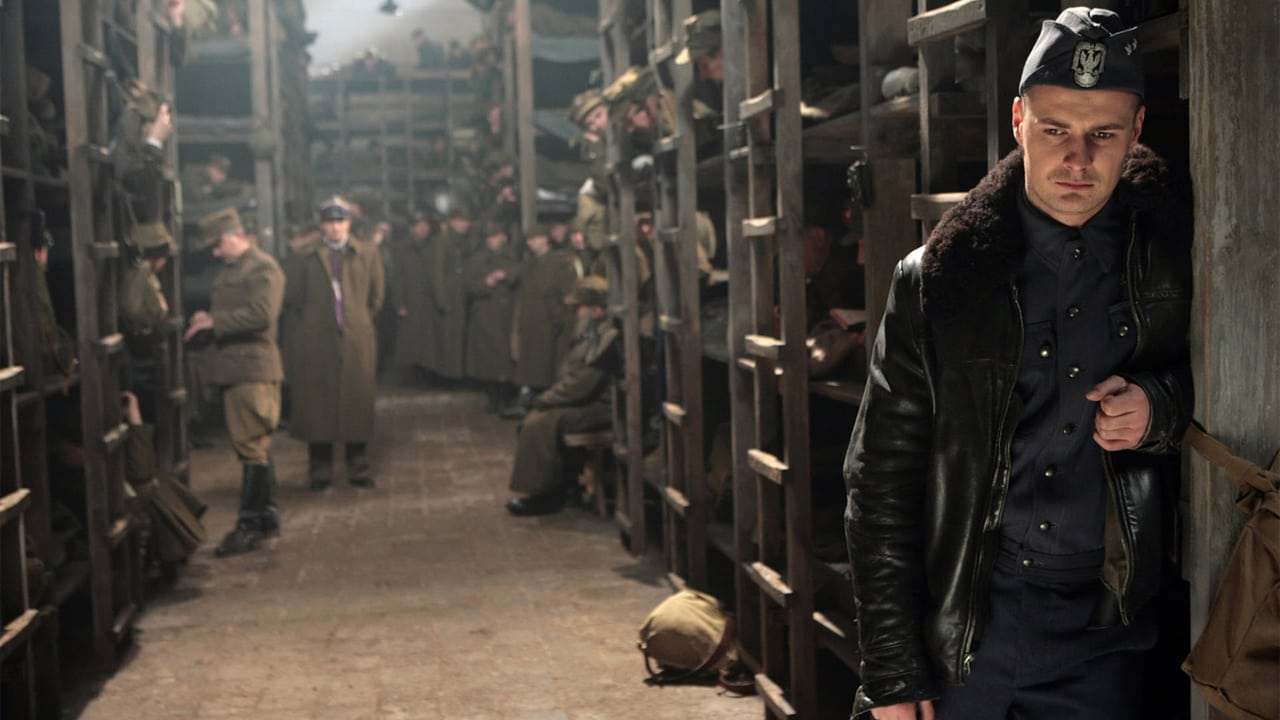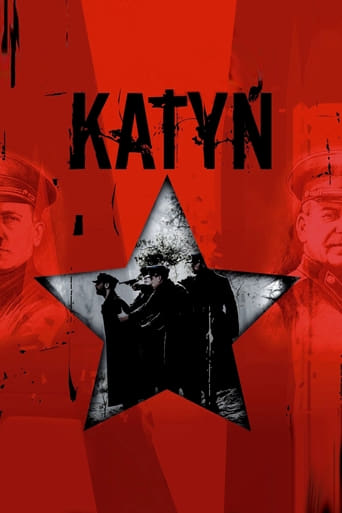

It's Sept 1939. Anna and her daughter Nika are part of the stream of humanity heading east escaping the Nazis. They run into refugees heading west escaping the Soviets. Anna's husband Andrzej is a cavalry captain captured by the Soviets. He is one of 20k Polish officers held as POWs. His father is an university professor in Nazi-occupied Krakau. The teachers are all taken to concentration camps. Anna struggles to return to Krakau. Lt. Jerzy gives his sweater to Andrzej. As the war goes on, both the Nazis and the Soviets blame the other for the Katyn massacre of the Polish officers. The families of these men struggle to find the truth and conform to the various government officials during and after the war.It's always important to correct a history that has been distorted by propaganda for so long. This does it sincerely and that is noteworthy. It does cover a lot of ground during and after the war. It's probably important to see the official account changing from one dictatorial government to the next. When the movie moves away from Anna, it does loses the thread of the story telling. While it's a sincere telling, the story does get muddled going between the various characters.
... View MoreThis film failed to explain why stalin ordered to kill all the officers. that was still a mystery to me after watching it. it didn't have any scenes from the Russian's perspective at all. that could have made this film much more powerful. it was just one side of story. it also didn't explain in a deeper level why the russians decide to make false accusations against the German as who killed those officers.the film itself is too long and gets boring in some scenes, and it has random short stories.it does have good cinemaphotography.the history event itself is sad, but this film didn't make me feel emotional.
... View MoreAndrzej Wajda's "Katyn" begins effectively with the visual illustration of startled Polish citizens fleeing the invading German army, only then to run into other citizens heading in the opposite direction escaping the Soviet forces invading from the east. Within this crowd of citizens, Wajda settles the focus on Anna travelling with her young daughter Nika . Anna's husband Andrzej is one the 25,000 Polish officers taken prisoner in 1939 by the Soviet Red Army. You begin to sense the fate that awaits these prisoners of war, not more so with the brutally important point of the Soviets refusal to sign the Geneva Convetion rules for the treatment of prisoners of war. The film then ventures along throughout three decades from the 1930's to the 1960's presenting life under German rule, then subsequently under post-war Soviet occupation. for all its good intentions, unfortunately, the final third of the film is "Katyn's" let down, becoming confusing and tedious with too many separate interwoven stories.Expectedly, the film continuously reminds the world of the treatment of Polish prisoners of war and eventually the Katyn Forest massacres, not for once denying the NKVD responsibility and Soviet cover up. Also, emphasising for many years after the war had ended, the citizens through fear were denied a voice. To emphasising these points, the film, needlessly, splits into two. One focusing on the fate of the prisoners of war. The other into the repression of two/three generations of those connected with the officers slaughtered in Smolensk. The interwoven stories may appear to some as creative, to others irritating. The film, on reflection, would have been more powerful if solely concentrating on the former. Notable, demonstrated in the final 15 minutes of the film which are horrifically effective.In addition, to an audience unfamiliar with modern Polish history or knowledge of Soviet war crimes may misleadingly except "Katyn" as it appears. Firstly; in 1945 Politicians, citizens and soldiers of Allied Poland, USSR, USA, Britain, were through manipulative fact or fictitious propaganda and the Noremburg trails unaware of the genuine fate of the polish officers taken prisoner in 1939. The truth remand hidden from foreign governments until 1972, even-more, the formal truth did not become widely published until after the collapse of the Soviet Union in 1991. Secondly, even though Katyn is from a Polish perspective, it would of provided more depth to the film if it attempted to mention why for their own act of revenge, own sovereignty and security against past reprisals, the Red Soviet authorities made the decision to murder the Polish armies high command.Finally, "Katyn" is a well made film, if conceived as chronologically confusing at times. Furthermore, it is an honour to the many murder by the NKVD, not more so, the directors father.
... View MoreVeteran Polish director Andrzej Wajda take on the Katyn Massacre, the 1940 execution in a few days (probably a world record in mass murder) of some 20,000 Polish officers captured during the previous year invasion of Eastern Poland by the Soviet Union (in complicity with Nazi Germany who had invaded the western part of Poland).As the movie begins, the Polish officers are being transported in trains to the Soviet Union as prisoners. Meanwhile the Germans are also doing mischief in their controlled part of Poland, detaining the professors of Krakow University and sending them to concentration camps. After a brief interlude in World War II, the movie moves on to the post war. In new communist Poland, when one of the widows of the slain officers tries to inquire to authorities about his fate, she is told is better to kept quiet. The movie ends with a recreation of some of the executions.Aimed primarily at a Polish audience, this is a well made film, with good production values, but also curiously (for lack of a better word and given the subject matter) bloodless (the most moving part of the film is a real Nazi newsreel that shows the mass graves being exhumed by the Germans for propaganda purposes). I think it could have benefited by being less restrained and more polemical. Still, a worthy and interesting film.
... View More